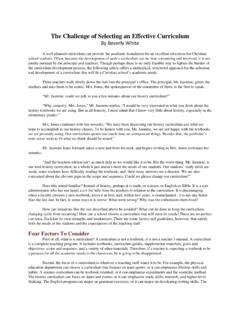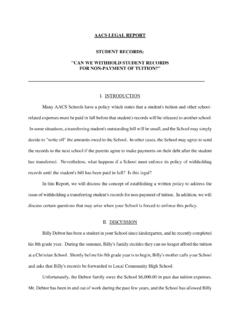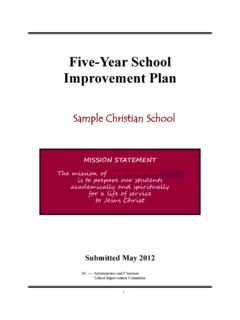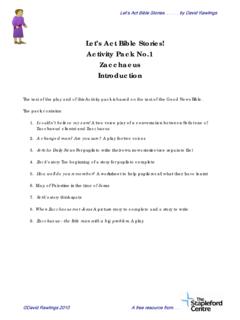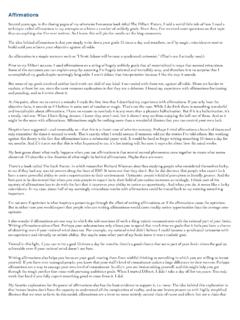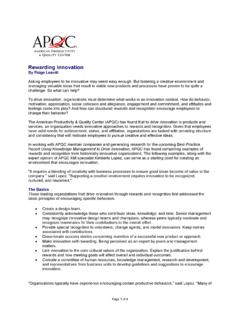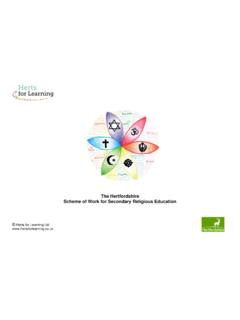Transcription of Effective Teaching-What Does It Look Like-Earwood
1 Effective teaching : what does It Look Like? BY E. DENNAE EARWOOD The problem of identifying Effective teaching is one that plagues school administrators, school boards, and school improvement committees all over the world. Everyone seems to have a different idea of who an Effective teacher is and how he or she acts. Cruickshank and Haefele identified ten Effective teaching styles but admit that there are excellent teachers who do not fit any of their identified molds (2001). Though Effective teaching comes in a variety of shapes, sizes, and personalities, a few prominent characteristics and practices remain common. The Person behind Effective teaching Learner Effective teaching is done by one who is a learner himself. Walker states that one never reaches the point of learning all that needs to be learned.. teaching is a learning process (2003, , 3).
2 The frenzied pace of change in modern society necessitates a person who is willing to learn. Not only will this teacher be constantly improving his or her teaching , but will also be exhibiting the very characteristics of study, diligence, and motivation that he or she is trying to develop in his or her students (Yount, 1996). For the teacher who is a learner, experience does not necessarily mean less time planning lessons, already prepared tests, or the same illustrations and stories as last year. Experience equals opportunity to improve one s knowledge as well as practice (Horton, 1992). Perhaps Yount says it best: The day I stop learning is the day I stop teaching (1996, p. 300). Human The person behind Effective teaching is also human, meaning that he or she is able, willing, and even desirous of developing positive relationships with the people, especially the students, with whom he or she works.
3 The majority of teachers have a sincere desire to improve their students lives, but it is obviously impossible to influence one with whom there is no relationship. Tomlinson and Doubet report that one of the most pressing concerns of teachers is the near impossibility of getting to know their students, yet this relationship is absolutely essential to understanding and motivating students (2005). While it is true that some students are intrinsically motivated to learn and would be able to learn regardless of who taught them, the number of students who are not so creates a tremendous need for a teacher who can relate. Carson, interviewed by Tomlinson and Doubet states simply, Unless they have a relationship with me, students have no desire to learn (2005, p. 9). Effective teachers make students feel comfortable and welcome in the classroom, show interest in their non-academic lives ( , attending ballgames and concerts), and discover students strengths and weaknesses through conversation and observation.
4 In addition to opening the way for influence, a positive rapport with students can go a long way toward developing a child s self-concept as a learner, which, in turn, is a signifi cant factor in student success in school (Deuink, 1988, p. 63). A positive relationship with students also motivates students to live .. within classroom rules (Prather in Tomlinson and Doubet, 2005, p. 13). Finally, an Effective teacher is human from the perspective of not only the student but also the parents. Parents are understandably more comfortable with one whom they know understands the student s family background and the opinions of the parents concerning their child s education (Boers, 2001). Again, Yount summarizes this characteristic very well: Teachers who are warm, caring, and friendly set a positive emotional tone in the classroom.. Contrast this with teachers who are cold, uncaring, and aloof.
5 The former engage all students in an effort to help them learn, the latter confront students in an effort to combat ignorance. It is clear which kind of classroom produces openness, curiosity, and freedom to ask questions (1996, p. 296). Mature Professionally A teacher has many professional relationships to develop and maintain. The Effective teacher handles these relationships maturely. Herbster cites several responsibilities that the teacher has to his superior(s). First, he or she seeks to resolve problems early and with the one with whom the problem exists. The teacher also consistently enforces school policy (1988). Both of these practices help to maintain open communication and allow the teacher to freely approach the administrator with problems, ideas, or suggestions. Concerning his or her fellow teachers, the Effective teacher cooperates with colleagues by offering encouragement, advice, care, and assistance.
6 Furthermore, he or she is willing to learn from fellow teachers; at times, they will be able to offer this same encouragement, advice, and assistance. The Effective teacher avails himself or herself of this resource (Herbster, 1988). Academically An Effective teacher is mature in his particular academic field as well as supplementary areas such as literature, painting, and music (Yount, 1996, p. 300). This supplementary knowledge is a good source of illustrations to use in the classroom (Yount, 1996), and it makes the teacher better able to relate to the variety of students he or she will face. This maturity also involves knowing how to present the subject to those who are immature (Horton, 1992). While just knowing content is not enough, a grasp of academic content is certainly of primary importance for Effective teaching . Spiritually In addition, the person behind Effective teaching must be mature in spiritual matters.
7 From the Christian s perspective, this maturity is perhaps most important. The student will become like the teacher in academics as well as spirituality. To be Effective , the Christian teacher must model Christlikeness through the power of the Holy Spirit (Herbster, 1988). The Practices behind Effective teaching Accommodates the Needs of All Learners Effective teaching adjusts its teaching methods and strategies to meet the needs of all learners. This practice begins with an attitude (Bowen & Parker, 1990): the Effective teacher must want to meet the various needs of the students. Meeting the needs of a variety of students in a classroom can be further complicated by the inclusion of special education students within the general classroom. Most schools offer special education services for students with special needs; however, these students are very likely to spend at least part (sometimes the majority) of their day in a general classroom setting.
8 Thomas states that the growing preference for the educational setting of students with mental retardation and other disabilities is indeed the general education classroom. The general education teacher must be equipped to help these students reach their highest potential. The teacher must also be able to challenge gifted students and keep disturbances from especially active students to a minimum. The Effective teacher makes use of a variety of teaching practices including such motivating techniques as cooperative learning and peer tutoring to help accomplish these goals (Hardin & Hardin, 2002). The Effective teacher is one who is willing and knowledgeable enough to adapt teaching strategies and methods to meet the varied needs of the learner. Practices Good Classroom Management Another practice that results in Effective teaching is that of good classroom management.
9 Good classroom management is almost invisible (Canter & Canter, 2001, p. 171), meaning that it is something that an Effective teacher does , but he or she does it in a way that the students do not recognize that they are being managed. Classroom management involves discipline of behavior and management of routines and procedures. Discipline of Behavior Management of students behavior is essential for learning to take place. Effective teachers do not let lack of preparation, fear of students, or an inability to identify patterns of bad behavior prevent them from maintaining the best possible learning environment (Jacquot, 1984). The Effective teacher s discipline works because it is based on the proper motive. The Effective teacher does not discipline only to make his or her life easier. In a Christian setting, the ultimate purpose for discipline is to lead the students to Christlikeness.
10 Other valid purposes for discipline include enhancement of learning, permanent behavior change, and encouragement of self-discipline in the student (Jacquot, 1984). This last purpose is extremely important because self-discipline is necessary for growth (Horton, 1992), and growth of some kind (academic, physical, social) is the goal of all education. The Effective teacher s discipline of behavior works because of the methods he or she uses to discipline. Marzano and Marzano state that the most important factor in classroom management is the teacher-student relationship, which is built on a teacher s specifi c behaviors (2003). Students own perspectives on their teachers discipline point out several of these behaviors. First, students say that good teachers discipline on an individual basis rather than in front of the entire class.
